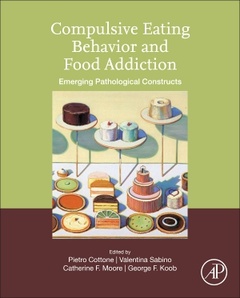Description
Compulsive Eating Behavior and Food Addiction
Emerging Pathological Constructs
Coordinators: Cottone Pietro, Moore Catherine F, Sabino Valentina, Koob George F.
Language: English
Subjects for Compulsive Eating Behavior and Food Addiction:
496 p. · 19x23.3 cm · Hardback
Description
/li>Contents
/li>Readership
/li>Biography
/li>Comment
/li>
Compulsive Eating Behavior and Food Addiction: Emerging Pathological Constructs is the first book of its kind to emphasize food addiction as an addictive disorder. This book focuses on the preclinical aspects of food addiction research, shifting the focus towards a more complex behavioral expression of pathological feeding and combining it with current research on neurobiological substrates. This book will become an invaluable reference for researchers in food addiction and compulsive eating constructs.
Compulsive eating behavior is a pathological form of feeding that phenotypically and neurobiologically resembles the compulsive-like behaviors associated with both drug abuse and behavioral addictions. Compulsive eating behavior, including Binge Eating Disorder (BED), certain forms of obesity, and ?food addiction? affect an estimated 70 million individuals worldwide.
1. A history of “food addiction 2. Food addiction prevalence: development and validation of diagnostic tools 3. Dissecting compulsive eating behavior into three elements 4. Habitual overeating 5. Reward deficits in compulsive eating 6. The dark side of compulsive eating and food addiction: affective dysregulation, negative reinforcement, and negative urgency 7. Food addiction and self-regulation 8. Reward processing in food addiction and overeating 9. Interactions of hedonic and homeostatic systems in compulsive overeating 10. Genetics and epigenetics of food addiction 11. Neuroimaging of compulsive disorders: similarities of food addiction with drug addiction 12. Modeling and testing compulsive eating behaviors in animals 13. Sex and gender differences in compulsive overeating 14. Addressing controversies surrounding food addiction 15. Food addiction and its associations to trauma, severity of illness, and comorbidity
Advanced students and researchers in cognitive and behavioral neuroscience, psychology, psychiatry, psychotherapy and psychopharmacology
clinicians in psychiatry and psychology treating patients with eating disorders and food addiction
Catherine Moore received her PhD in Neuroscience with a specialization in Biomolecular Pharmacology at Boston University in 2019, where she worked under the advisement of Dr. Pietro Cottone. Her doctoral research focused on addictive behaviors and compulsivity, and during graduate school she published numerous original and review articles investigating and delineating the underlying causes of food addiction and compulsive eating. She was awarded the Ruth L. Kirschstein National Research Service Award (NRSA) from the National Institute on Drug Abuse for her research in this area. Catherine was also a fellow of Boston University’s Transformative Training Program in Addiction Science, a program built upon cross-disciplinary and co-mentoring training of scientists to bridge the gaps present in the varying addiction research disciplines and public health. She is currently a Postdoctoral Fellow at Johns Hopkins University School of Medicine.
Dr. Sabino is co-director of the Laboratory of Addictive Disorders, and is currently researching the neurobiology
- Synthesizes clinical and preclinical perspectives on addictive eating behavior
- Identifies how food addiction is similar and/or different from other addictions
- Focuses on the underlying neurobiological mechanisms
- Provides information on therapeutic interventions for patients with food addiction




